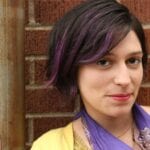Organizers of Pride in London, Ontario, are ready to come out — of the parking lot, that is.
Participants in the annual gay pride week there will be putting themselves in the front and centre of the city, ending with a weekend-long festival in Victoria Park.
Victoria Park is the city’s major event site; it also hosts Ribfest and the Home County Folk Festival. For Pride vice-president Andrew Rosser, moving into the space is a sign that London Pride is ready to take its place as a highlight of the city.
“We’re excited to move into a mainstream festival location,” he says, noting it’s a watershed moment. Last year, the Pride festival was held in a parking lot at the corner of Clarence and King streets, he says.
The weekend in the park will include a stage with kid-friendly entertainment and a “pet zone” for dogs to drink water and play. The event ends with a Sunday-afternoon post-parade party, featuring Canadian rock band The Cliks.
The week of festivities includes an all-ages Pride party, gay karaoke and a prayer service at the Metropolitan Community Church.
London’s rocky history of homophobia is personal for many people. “Every gay person in London, lesbian, gay, bisexual [or] transgendered person, would say they know of or experienced an act of hatred in our city,” Rosser says. “Although I don’t think that’s unique to our city, we have to recognize that it exists.”
In 1995, organizers requested that then-mayor Dianne Haskett issue a city proclamation in support of their Pride march. She refused. The incident led to a three-year legal battle. In October of 1997, the Ontario Human Rights Commission fined the mayor and city $10,000 and ordered city council to make the proclamation.
Haskett, who is now a lawyer in Washington, DC, did not answer calls for comment.
Later, in 1999, the 3,500-strong parade found itself crossing paths with about 70 heterosexual “straight pride” counter-marchers. Some of the counter-marchers carried signs; one wore a construction helmet and used a bullhorn to denounce the gay event. Rosser says similar protests still happen. “There’s always a small group,” he says. “But it never affects our celebration.”
The city’s subsequent mayor, Anne Marie DeCicco-Best, wrote letters of support but never took part in the parade, Rosser says.
It wasn’t until 2011 that a new London mayor, Joe Fontana, made history and attended Pride. It was the same year Toronto’s Rob Ford broke tradition and refused to attend Toronto Pride, taking his family to the cottage instead.
Organizers are confident that this year, London Pride will be a week of celebration.
“We just really want everyone to come out, gay or straight,” Rosser says. “Pride is about celebrating together as one community.”
The Pride London Festival runs Sunday, July 22 to Sunday, July 29. For more information, visit pridelondon.ca.
Written with archives from The Globe and Mail and Canadian Press.

 Why you can trust Xtra
Why you can trust Xtra


